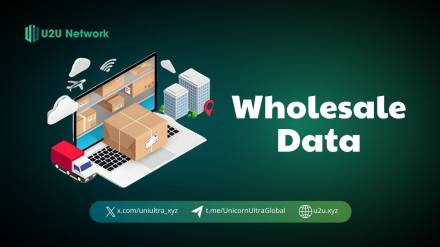In the rapidly changing digital age, where businesses must constantly adapt and innovate to survive, the application of advanced technologies is indispensable. Among these technologies, blockchain is emerging as a promising solution to help businesses address future challenges, from enhancing security to optimizing operational efficiency.
Table of Contents
What is blockchain and why is it important?
Blockchain is a distributed ledger technology that allows secure, transparent, and efficient storage and sharing of information. It operates as a chain of data blocks, with each block linked to the previous one through a cryptographic hash function. As a result, any changes to the chain can be easily tracked and verified. The importance of blockchain lies in its ability to:
Enhance security: Transactions on blockchain are encrypted and distributed, making them nearly tamper-proof. This helps protect business data from threats such as cyber-attacks and fraud.
Increase transparency: All transactions on blockchain are recorded publicly and accessible to all participants. This enhances trust and transparency in business operations.
Optimize efficiency: Blockchain enables automated business processes and faster transaction processing, reducing errors and costs.
With these significant advantages, it's no surprise that many businesses are exploring ways to integrate blockchain into their operations. This article aims to provide a clearer understanding of blockchain integration services, along with the applications and benefits of using this technology within enterprises.
Blockchain Integration Services
Blockchain integration transforms business processes beyond mere adoption of blockchain technology. It establishes a secure, transparent, and efficient business environment by creating a dedicated blockchain ecosystem where transactions are immutable and verified by all participants.
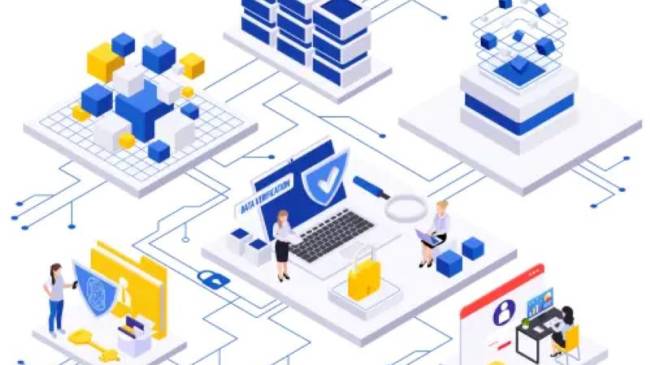
This integration acts as a robust tool supporting business operations, fostering transparency and reliability to enhance market competitiveness and stakeholder trust. Ultimately, blockchain integration serves as a foundational element for businesses to optimize operations, cultivate trust among stakeholders, and drive growth in the competitive marketplace.
Blockchain Platforms
Currently, there are numerous blockchain platforms being utilized across enterprises, depending on their specific purposes and requirements. Here are some examples of popular blockchain platforms used in businesses:
- Hyperledger: Developed by the Linux Foundation, Hyperledger is an open-source platform capable of integrating various types of blockchains. It provides tools to build and manage blockchain applications efficiently.
- Ethereum: An open-source blockchain platform used to develop decentralized applications (dApps). Ethereum offers a reliable environment for deploying smart contracts and conducting transactions with cryptocurrencies.
- Ripple: Designed specifically for transferring money between banks and financial institutions, Ripple boasts fast transaction processing speeds and lower costs compared to traditional methods.
- VeChain: Specializes in supply chain management and product origin tracking. VeChain enhances transparency and trust in business operations by providing detailed product lifecycle data.
Blockchain Recruitment
Blockchain technology has recently become a prominent trend in hiring practices among businesses. This trend not only highlights the evolution of blockchain but also raises concerns about attracting and retaining qualified blockchain professionals.

By the end of 2019, LinkedIn recorded approximately 5,000 job postings related to blockchain, indicating a growing demand for blockchain expertise across industries such as finance, retail, healthcare, and logistics. However, recruiting and training employees with proficient blockchain skills pose significant challenges for businesses. In the Vietnamese market specifically, there is a scarcity of individuals with practical experience and in-depth understanding of blockchain technology. Consequently, investing in training and developing talent has become crucial for effectively integrating blockchain into business operations.
Blockchain Applications
Blockchain technology extends beyond traditional financial and supply chain sectors, finding diverse applications across all business domains. Here are some notable examples of blockchain applications:
Payments and Transactions: Blockchain can process payments swiftly, securely, and transparently. For instance, it facilitates rapid fund transfers between banks and financial institutions.
Identity Management and Authentication: Blockchain securely stores and verifies personal information, enhancing security and transparency in managing identities for customers, employees, or business partners.
Insurance: Blockchain builds smart contracts to manage and settle insurance claims efficiently, reducing risks and costs associated with claim management and settlements.
Supply Chain Management: Blockchain tracks and manages product origins within the supply chain, enhancing transparency and trust in manufacturing and distribution processes.
Asset and Financial Management: Blockchain manages and trades assets and finances, from cryptocurrencies to securities and real assets, bolstering transparency and reliability in investment and financial transactions.
Blockchain in Vietnam
In recent years, blockchain has emerged as a rapidly developing technology trend in Vietnam. This technology is not only adopted by large enterprises but also attracting attention from startups and newly established businesses. Vietnam is increasingly seen as a promising market for blockchain applications.

Some prominent applications of blockchain in Vietnam include:
- E-Wallets: Blockchain technology is used in electronic wallet applications to provide secure and convenient payment services to users. Examples include MoMo, ZaloPay, AirPay, among others.
- Supply Chain Management: Blockchain is utilized to track the origin and manage the supply chain of agricultural products, food items, and consumer goods, enhancing transparency and trust for consumers.
- Insurance: Blockchain technology is applied in the insurance sector to manage customer information, insurance contracts, and claims settlements transparently and efficiently.
- Healthcare: Blockchain is employed to securely store and share medical data among healthcare facilities, hospitals, and patients.
Vietnam has also seen various blockchain-related projects and initiatives, such as FPT Corporation implementing blockchain in supply chain management, Viettel with its electronic wallet application ViettelPay, and numerous startups developing promising blockchain applications.
These advancements underscore Vietnam's growing interest and capability in leveraging blockchain to innovate and address various industry challenges, contributing to the country's technological evolution.
Real-life examples of Blockchain applications in industries
Financial Sector:
- Ripple: Ripple is not just a payment network but also a technology company providing blockchain-based payment solutions for banks and financial institutions. Ripple's technology, particularly the XRP Ledger, has been used to facilitate fast and efficient cross-border transactions.
- DeFi (Decentralized Finance): Compound and Aave are two prominent examples of successful DeFi projects, but there are many others rapidly developing in this field. DeFi is opening up a new financial ecosystem where users can access financial services without relying on traditional intermediary organizations.
Supply Chain
- IBM Food Trust: This project has been renamed IBM Blockchain Transparent Supply Chain, focusing on tracking the provenance of food and other products using blockchain technology.
- Walmart: Walmart has implemented blockchain in various areas of its supply chain, including tracking the origin of food, managing inventory, and automating payment processes.
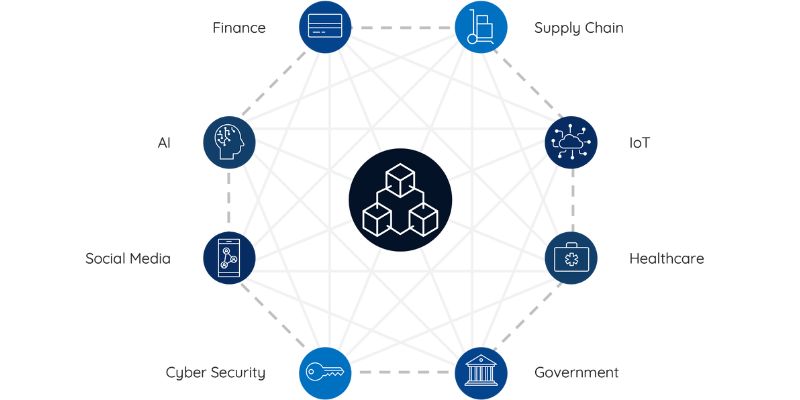
Healthcare
- MedRec: This project is still in development and not widely implemented yet. However, blockchain's potential in managing electronic health records is significant, promising to significantly improve healthcare quality and protect patient privacy.
- BurstIQ: This platform focuses on managing and analyzing big healthcare data, helping researchers and healthcare service providers make more informed decisions.
Real Estate
- Propy: Propy is not only a real estate transaction platform but also provides blockchain solutions for contract management, payments, and property ownership registration.
- Ubitquity: Ubitquity is a leading company providing blockchain solutions for the real estate industry. Their solutions streamline transaction processes, reduce costs, and enhance transparency.
The Future of Blockchain
With its vast potential and diverse applications, blockchain technology is predicted to continue its robust development in the future. Here are some trends and potentials of blockchain:
- Integration with IoT and AI: Blockchain can integrate with Internet of Things (IoT) and Artificial Intelligence (AI) to create smart and automated applications across various sectors such as transportation, healthcare, agriculture, and more.
- Development of DeFi: Decentralized Finance (DeFi) is a new trend in the financial sector using blockchain technology to build decentralized financial services. DeFi has the potential to transform traditional financial operations.
- Blockchain and E-Government: Blockchain technology can be applied in developing e-government services, from managing citizen data to organizing online voting, enhancing transparency and efficiency in government operations.
- NFTs and Blockchain Gaming: Non-Fungible Tokens (NFTs) are a new application of blockchain in creating and managing unique digital assets. They can be widely applied in the gaming and digital art sectors.
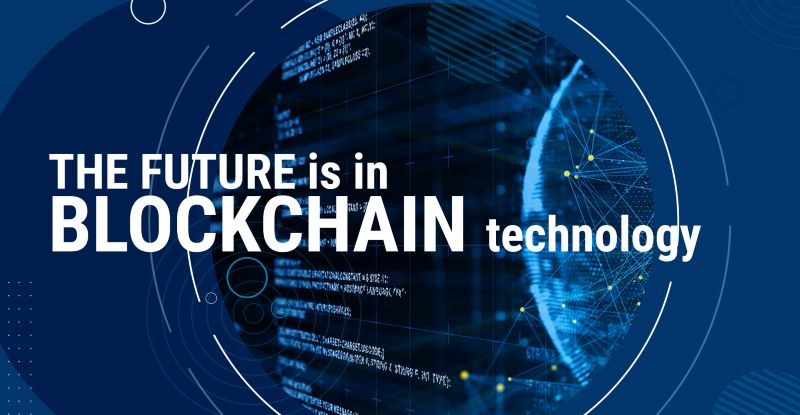
Advanced blockchain integration services are not just an option, but a necessary step for your business to adapt and thrive in the digital era. By leveraging blockchain technology, businesses can optimize processes, reduce costs, enhance security and transparency, and open up new business opportunities.
Blockchain integration services not only help businesses address current challenges but also equip them with the capability to face future changes. Investing in blockchain integration is investing in the sustainable growth and competitive edge of your business in the global market. Don't miss this opportunity to lead your business into the new era of technology and innovation. Follow U2U Network to update the latest information about Blockchain


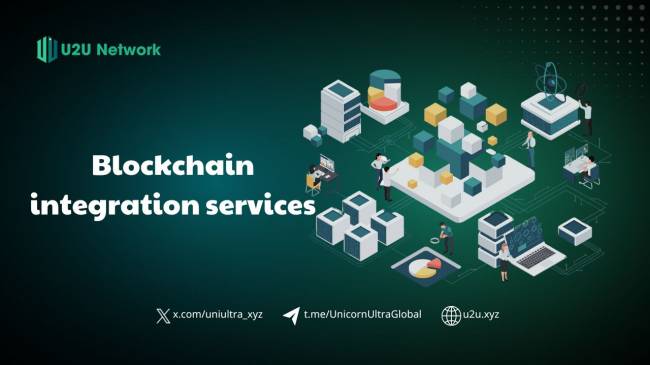
.png)

